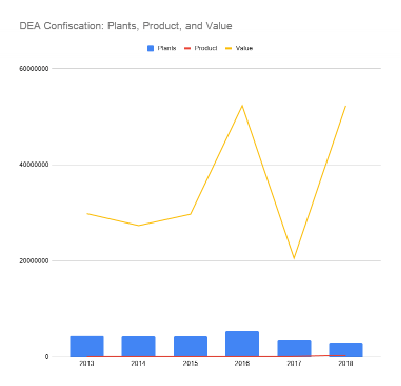DEA Sends Aggressive Message: Illegal Cannabis Operators Will Go To Prison


Source: DEA Domestic Cannabis Eradication / Suppression Program
The US Drug Enforcement Agency may be stepping up efforts to send illegal cannabis operators to prison. The DEA announced this week that it worked with local law enforcement agencies to successfully prosecute two Aurora, Colorado residents for illegal cannabis cultivation. The pair will serve thirty (30) months in prison. The federal investigators noted that this is the first sentencing from a massive investigation into the illegal production and distribution of marijuana that resulted in the search of 255 homes, the confiscation of over 80,000 marijuana plants and 4,500 pounds of marijuana product.
U.S. Attorney Jason Dunn noted that “As the first to be sentenced in this operation, I hope it sends a message to anyone involved in black market marijuana production that we will catch them, prosecute them, and send them to prison.”
The DEA has long worked with state and local law officials to eradicate marijuana and prosecute the defendants through the Domestic Cannabis Eradication / Suppression Program. The DEA’s criminal authority provides legal states like California and Colorado with leverage to raise the stakes against illegal cannabis violators by helping federal enforcement agencies bring criminal prosecutions. Many of these state and local law enforcement agencies receive funds from the DEA to eradicate illegal cannabis operations.
What is the Domestic Cannabis Eradication / Suppression Program?
The DEA started the Domestic Cannabis Eradication/Suppression Program in 1979 to fund local efforts to eradicate marijuana in California and Hawaii. In 2017, the DEA provided nationwide support to over 126 state and local law enforcement agencies. In 2020, around 15 California counties received funds from the DEA including Alamada, Calaveras, Del Norte, El Dorado, Humboldt, Madera, Mendocino, Merced, Sacramento, San Bernardino, Shasta, Sierra, Tulare, and Yuba. Local authorities must sign an agreement that outlines how the funds will be used.
Since 2014, the DEA and local authorities seized 24,504,457 plants and 947,607 pounds of marijuana product with a market value of $212,021,109.58. The marijuana confiscations resulted in 34,892 arrests. The number of arrests remained relatively constant between 2014 and 2018. However, the amount of marijuana product confiscated in 2018 more than doubled. During this period, California accounted for over 67% of the plant seizures and one-third of the arrests.
Are the enforcement efforts working?
No, the illegal market continues to grow. Recent estimates suggest that the illegal market accounts for 80% of all sales and brings in $8.7 billion in revenue. California counties are struggling to keep control of illegal marijuana cultivation.
Last year, Governor Gavin Newsome committed to ramping up this effort by deploying national guard troops to join the Counterdrug Task Force. In FY19, the Counterdrug Taskforce confiscated 109,721 pounds of processed and 1.6 million plants with a street value of $1.8 billion. The numbers are impressive but it does not seem to be making a dent in the market.
Siskiyou County recently declared a state of emergency and requested money from the state to help deal with the proliferation of illegal cannabis cultivation sites. The county states that it has become a major drug trafficking hub with the number of illegal sites at an unprecedented high with 1,500 to 2,000 properties being used for illegal activity throughout the county.
in 2019, the Siskiyou County Interagency Marijuana Investigation Team and the North State Major Investigation Team served 154 search warrants and confiscated over 61,599 plants, 17,763.5 pounds of marijuana product, and 6 honey labs with an estimated total East Coast retail value of $405,121,000 to $607,681,500.
Siskiyou County is not alone. Humboldt County saw a 700% increase in cannabis enforcement efforts during 2018 that brought in over $2 million in fines for the county. Since 2018, the Santa Barbara County Cannabis Program and Enforcement Team confiscated almost $300 million in marijuana products from 58 enforcement actions. Santa Barbara County suffered another blow when a prominent licensed cannabis cultivator was caught producing cannabis oil for the illegal market.
Will the DEA bring more criminal cases?
The DEA states that more criminal cases are coming. On February 14, 2020, the DEA along with the Tulare County Sheriff’s Department announced charges against a Fresno County man for allegedly growing more than 6,000 marijuana plants in his orange orchard. He faces life in prison and a $10 million fine. This is one of over 20 cases that the DEA has announced since November.
These cases and the statistics suggest that, regardless of legalization, federal and state law enforcement agencies are continuing to vigorously fight the illegal market. We believe that the federal government will take a more aggressive approach towards the illegal market if states like California and Colorado are unable to bring it under control. This is all bad news for the legal market that has fought to establish credibility and respect for the regulatory framework.
